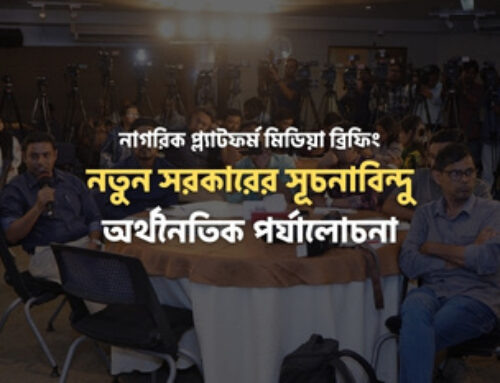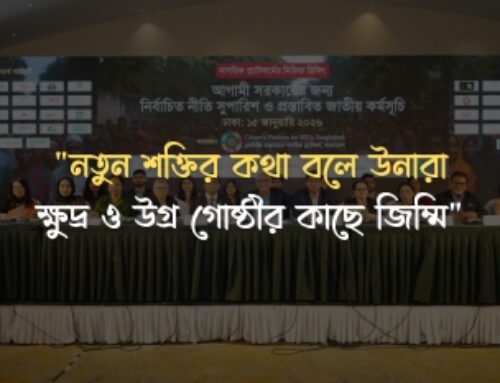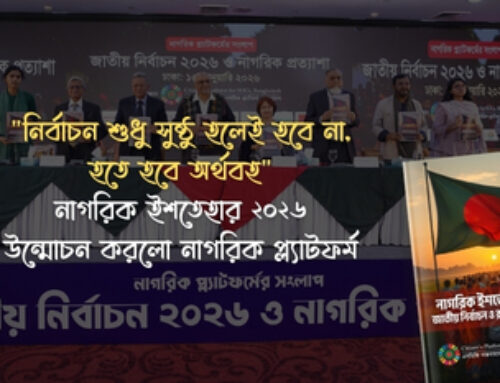To attain the Sustainable Development Goals (SDGs), Bangladesh must ensure engaging women in all possible sectors linked to country’s growth. In comparison to neighbouring countries, Bangladesh has made significant improvement in the areas of maternal mortality, women’s economic participation, gender parity in primary and secondary education. There are still pockets of extreme inequality which is a rising concern. Also despite important contribution made by women in the economy, i.e. healthy inflow of remittances, expansion in micro-credit operations and remarkable success in RMG, they are excluded from the mainstreams of the economic, social and cultural arena. Ensuring equal rights of women and creating space for their meaningful participation in every sector of development, therefore, is the key to achieve SDGs.
 Experts made these observations at a dialogue on Global development agenda and women’s rights: new considerations on 18 April 2017. The event was organised jointly by the Citizen’s Platform for SDGs, Bangladesh and Bangladesh Mahila Parishad at CIRDAP auditorium.
Experts made these observations at a dialogue on Global development agenda and women’s rights: new considerations on 18 April 2017. The event was organised jointly by the Citizen’s Platform for SDGs, Bangladesh and Bangladesh Mahila Parishad at CIRDAP auditorium.
Ms Rakhi Das Purakayastha, Joint-General Secretary of Bangladesh Mahila Parishad in her keynote presentation outlined the current level of female involvement in the political process in Bangladesh and existing wage discrimination in various industries. She recommended reforms in the existing laws to ensure women’s rights. She particularly mentioned about women in indigenous communities and felt that there is room for improvements in terms of gender equality where most females are deprived of economic, social, cultural and political rights mainly due to their ethnic status. One of the major problems for women in all minority communities is lack of adequate policies to protect or establish their rights, said Ms Purakayastha.
 Professor Wahiduddin Mahmud, former Adviser to the Caretaker Government, was present at the session as the Special Guest. He observed that achieving SDGs would be difficult without empowering women who constitute half the population. He urged the government to introduce a ‘wellbeing index for women’ that would help assess the real progress of working women. He referred women as the agency for economic development and youth as the demographic dividend to bring in new aspirations and thoughts for catalysing socio-economic changes. In view of the current contribution of women to the economy, Professor Mahmud focused on raising women’s efficiency with technical, vocational and skills training that will bridge their productivity gap with men counterparts.
Professor Wahiduddin Mahmud, former Adviser to the Caretaker Government, was present at the session as the Special Guest. He observed that achieving SDGs would be difficult without empowering women who constitute half the population. He urged the government to introduce a ‘wellbeing index for women’ that would help assess the real progress of working women. He referred women as the agency for economic development and youth as the demographic dividend to bring in new aspirations and thoughts for catalysing socio-economic changes. In view of the current contribution of women to the economy, Professor Mahmud focused on raising women’s efficiency with technical, vocational and skills training that will bridge their productivity gap with men counterparts.
The dialogue was chaired by Dr Debapriya Bhattacharya, Convenor of Citizen’s Platform for SDGs, Bangladesh. In his concluding remarks he identified four categories of working women- at domestic work, construction work, agricultural and expatriate. In all these areas they are at high risks in terms of socio-economic security. He called upon the government to enact laws, and ensure their implemention, for women to feel safe in the public sphere of life, and at work.
Ms Selima Ahmad, President, Bangladesh Women Chamber of Commerce and Industries (BWCCI) were also present at the dialogue as Special Discussants. The event was attended by human rights and development activists, entrepreneurs, lawyers, researcher, economists, business leaders and journalists among others.






